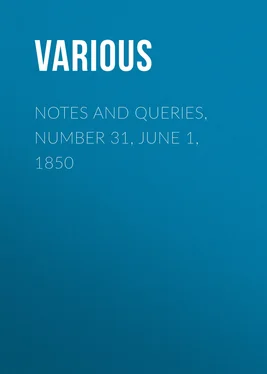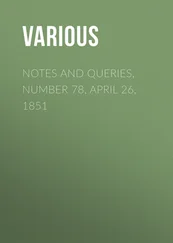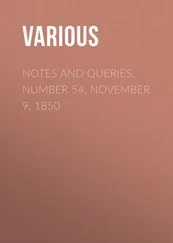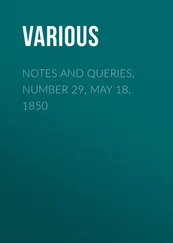Various - Notes and Queries, Number 31, June 1, 1850
Здесь есть возможность читать онлайн «Various - Notes and Queries, Number 31, June 1, 1850» — ознакомительный отрывок электронной книги совершенно бесплатно, а после прочтения отрывка купить полную версию. В некоторых случаях можно слушать аудио, скачать через торрент в формате fb2 и присутствует краткое содержание. Жанр: foreign_antique, periodic, foreign_edu, на английском языке. Описание произведения, (предисловие) а так же отзывы посетителей доступны на портале библиотеки ЛибКат.
- Название:Notes and Queries, Number 31, June 1, 1850
- Автор:
- Жанр:
- Год:неизвестен
- ISBN:нет данных
- Рейтинг книги:3 / 5. Голосов: 1
-
Избранное:Добавить в избранное
- Отзывы:
-
Ваша оценка:
- 60
- 1
- 2
- 3
- 4
- 5
Notes and Queries, Number 31, June 1, 1850: краткое содержание, описание и аннотация
Предлагаем к чтению аннотацию, описание, краткое содержание или предисловие (зависит от того, что написал сам автор книги «Notes and Queries, Number 31, June 1, 1850»). Если вы не нашли необходимую информацию о книге — напишите в комментариях, мы постараемся отыскать её.
Notes and Queries, Number 31, June 1, 1850 — читать онлайн ознакомительный отрывок
Ниже представлен текст книги, разбитый по страницам. Система сохранения места последней прочитанной страницы, позволяет с удобством читать онлайн бесплатно книгу «Notes and Queries, Number 31, June 1, 1850», без необходимости каждый раз заново искать на чём Вы остановились. Поставьте закладку, и сможете в любой момент перейти на страницу, на которой закончили чтение.
Интервал:
Закладка:
I throw out these rough hints in the hope that some of your correspondents will furnish their ideas on the subject, till we at last arrive at a fully practicable plan of carrying out Mr. Wyatt Edgell's suggestions, and, at all events, obtain transcripts, if not printed copies, of every register in the kingdom.
L.B.L.THE HUDIBRASTIC VERSE
"He that fights and runs away," &c. —Your correspondent MELANION may be assured that the orations of Demosthenes do not afford any trace of the proverbial senarius, ανηρ δ φευγων και παλιν μαχησεται; and it does not appear quite clear how the apophthegm containing it (which has been so generally attributed to Plutarch) has been concocted. Heeren, in doing full justice to the biographical talent of the Chæronean, has yet observed, "We may easily see that in his Lives he only occasionally indicates his authorities, because his own head was so often the source." It is in the life of Demosthenes that the story of his flight is told, but briefly; and for that part which relates to the inscription on the shield of Demosthenes, he says, 'ως ελεγε Πυθεας. The other life among those of the Ten Orators, the best critics think not to be Plutarch's; and the relation in it is too ridiculous for credit; yet it is repeated by Photius.
The first writer in which the story takes something of the form in which Erasmus gives it is Aulus Gellius ( Noct. Att. l. xvii. c. 21.):—
"Post inde aliquanto tempore Philippus apud Chaeroneam proelio magno Athenienses vicit. Tum Demosthenes orator ex eo proelio salutem fuga quaesivit: quumque id ei, quod fugerat, probrose objiceretur; versu illo notissimo elusit, ανηρ δ φευγων, inquit, και παλιν μαχησεται."
We here see that the senarius is designated as a well-known verse , so that it must have been in the mouths of the people long before it was applied to this piece of gossip. I have hitherto not been able to trace it to an earlier writer.
The Apophthegmata of Erasmus were first published, I believe, in 1531, in six books. I have an edition printed by Frobenius, at Basle, in 1538, in which two more books are added; and, in an epistle prefixed to the seventh book, Erasmus says,—
"Prodiit opus, tanta aviditate distractum est, ut protinus à typographo coeperit efflagitare denuo."
He names twenty-one ancient Greek and Latin authors from which the apophthegms had been collected; and, with regard to what he has taken from Plutarch, he mentions the licence he has used:—
"Nos Plutarchum multis de causis sequi maluimus quam interpretari, explanare quam vertere."
It is from this book of Erasmus that the worthy Nicolas Udall selected his Two Bookes of Apophthegmes ; and he tells his readers,—
"I have been so bold with mine author as to make the first booke and second booke, which he maketh third and fowerth."
Udall has occasionally added further explanations of his own to those translated from Erasmus. He promises, in good time, the remaining, books, but says,—
"I have thought better, with two of the eight, to minister unto you a taste of this bothe delectable and fruitefull recreation."
Those who are desirous of knowing at large the course pursued by Erasmus in the compilation of this amusing and once popular work, will find it fully stated in his preface; one passage of which will show the large licence he allowed himself:—
"Sed totum opus quodammodo meum feci, dum et explanatius effero qua Graece referuntur, interjectis interdum quæ apud alios autores additur comperissem," &c.
The only sure ground, as far as I can discover, for this gradually constructed legend, is the mention of the flight of Demosthenes by Æschines and Dinarchus. In the more amplified editions of Erasmus's Adages , after the publication of the Apophthegmata, he repeats the story in illustration of a Latin proverb (probably only a version of the Greek), "Vir fugiens et denuo pugnabitur;" and I find in some collections of the sixteenth century both the Latin and Greek given upon the authority of Plutarch! Langius, in his Polyanthea (a copious common-place book which would outweigh twenty of our late Laureate's) has given the apophthegm verbatim from Erasmus, and has boldly appended Plutarch's name. But the more extraordinary course is that which one Gualandi took, who published, at Venice, in 1568, in 4to., an omnium gatherum , in five books, from various sources, in which there is much taken from Erasmus, and yet the title is Apoftemmi di Plutarco . In this book, the whole of the twenty-three apophthegms of Erasmus which relate to Demosthenes are given, and two more added at the end. It appears that Philelphus, and after him Raphael Regius, had printed, in the fifteenth century, Latin collections under the title of Plutarch's Apophthegms , and, according to Erasmus, had both taken liberties with their original. I have not seen either of these Latin versions, of which there were several editions. As far as regards Demosthenes, I think we may fairly conclude that the story is apocryphal. The Greek proverbial verse was no doubt a popular saying, which Aulus Gellius thought might give a lively turn to his story, of which an Italian would say, "Se non vero è ben trovato."
S.W. SINGER.Feb. 9. 1850.
CUSTOM OF PRESENTING GLOVES
The following extracts from a MS. "Day-book" of the celebrated Anne Countess of Pembroke, recording the daily events of the last few months of her life passed at Brougham Castle in 1675, afford a further illustration of the custom of presenting gloves (Vol. i. pp. 72. 405.) as a matter of courtesy and kindness; and show, also, that it was not unusual to make presents of small sums of money in exhibition of the same feelings on the part of the donor:—
"January, as the year begins on New Year's Day.
"10th day, And to-day there dined here with my folks my cousin Thomas Sandford's wife, of Askham, and her second son; so after dinner I had them into my chamber and kissed her, and took him by the hand, and I gave her a pair of buckskin gloves, and him 5 s ., and then they went away.
"12th day. There dined here in the Painted Chamber with my folks Mrs. Jane Carleton, the widow, sister to Sir W'm. Carleton, deceased. So after dinner I had her into my chamber, and kissed her and talked with her awhile, and I gave her 5 s ., and she went away.
"17th day, To-day there dined with my folks my cousin, Mr. Thomas Burbeck, of Hornby, and his wife and their little daughter, and his father-in-law, Mr. Cotterick, and his wife and his mother; and there also dined here Mr. Robert Carleton, only son to the widow, Lady Carleton. So after dinner I had them all into my chamber, and kissed the women, and took the men by the hand, and I gave to my cousin, Mr. Burbeck, and his wife each 10 s ., and his mother 10 s ., and his father-in-law, Mr. Cotterick, and his wife, each of them 10 s ., and 6 s . to the child, and I gave Mr. Carleton a pair of buckskin gloves, and then they all went away."
In another entry the Countess records the gift to a Mrs. Winch of Settra Park of "four pair of buckskin gloves that came from Kendall."
It does not appear that any present was made to the Countess in return. As in the case of Archbishop Laud and Master Prynne (Vol. i. p. 405.), these gifts were evidently expressions of condescension and good will by one in a high position to another in a somewhat lower station. It is, I take it, evident that the money-gifts, from the rank in life of the parties, and their connection with the Countess, could have been made with no other meaning or intention.
JAS. CROSBY.Streatham, April 22. 1850.
Читать дальшеИнтервал:
Закладка:
Похожие книги на «Notes and Queries, Number 31, June 1, 1850»
Представляем Вашему вниманию похожие книги на «Notes and Queries, Number 31, June 1, 1850» списком для выбора. Мы отобрали схожую по названию и смыслу литературу в надежде предоставить читателям больше вариантов отыскать новые, интересные, ещё непрочитанные произведения.
Обсуждение, отзывы о книге «Notes and Queries, Number 31, June 1, 1850» и просто собственные мнения читателей. Оставьте ваши комментарии, напишите, что Вы думаете о произведении, его смысле или главных героях. Укажите что конкретно понравилось, а что нет, и почему Вы так считаете.












